
Fishermen fight to survive on the world's second largest lake
Lake Victoria supports hundreds of thousands of people, but overuse caused fish populations to collapse. Uganda sent in soldiers—but has it worked?
Kasensero, Uganda — On the edge of town, Ssebulime Kisakye is building a church. Behind the closed fish-processing factory, on a quiet beach covered in scraggly grass, he has erected a frame of raw timbers and a rough-hewn pulpit.
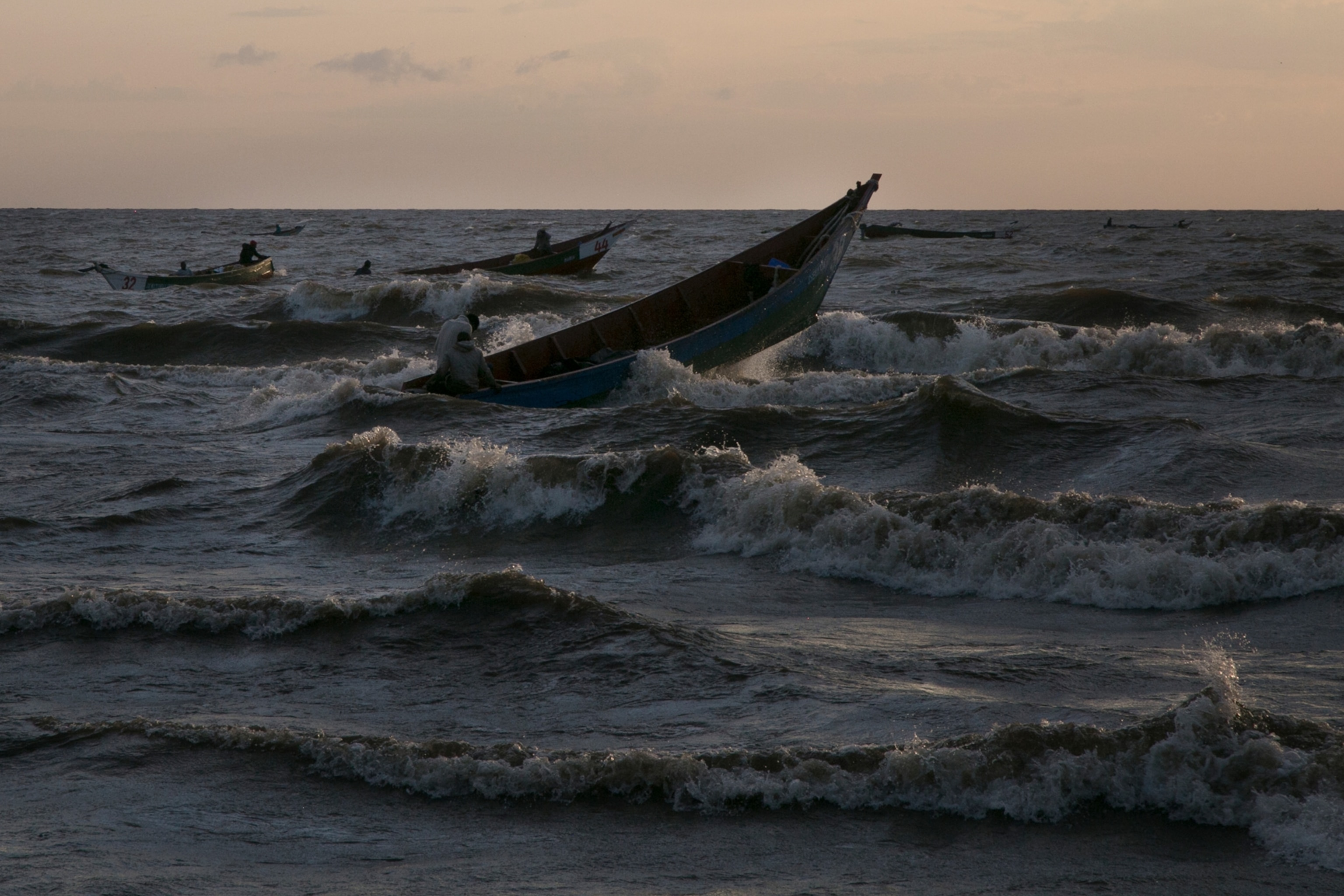
“It is important for my church to be here so that the lake can cleanse sinners,” he says, wearing a clerical collar and looking through the outline of walls at Lake Victoria. “These are people who have done bad things.”
But along the shores of this 26,600-square-mile lake, the second largest freshwater body in the world, separating the good from the bad and the saints from the sinners is a complicated task.
The sinners Kisakye has in mind are the fishermen who, enabled by corrupt officials, caught so many fish, mostly Nile perch and Nile tilapia, that the fish plant here had to close in 2014. Some of those fishermen were refugees just trying to scrape out a living.
Ecologists, meanwhile, might blame other sinners for the current state of Lake Victoria: the British colonial authorities who, in the 1950s and 1960s, first stocked the lake with invasive perch and tilapia. They succeeded in creating a valuable commercial fishery—fish are Uganda’s second largest export, after coffee—but also a spectacular decline of native fish, one that has become a textbook example of human-caused extinction.
And finally, there are the latest characters in Lake Victoria’s drama: the Uganda People’s Defense Force (UPDF), dispatched in 2017 by President Yoweri Museveni to eradicate illegal fishing. Fish stocks do seem to be increasing again—but some poor fishermen have lost their livelihoods, and it’s alleged that some even lost their lives or their homes to violence perpetrated by the soldiers.
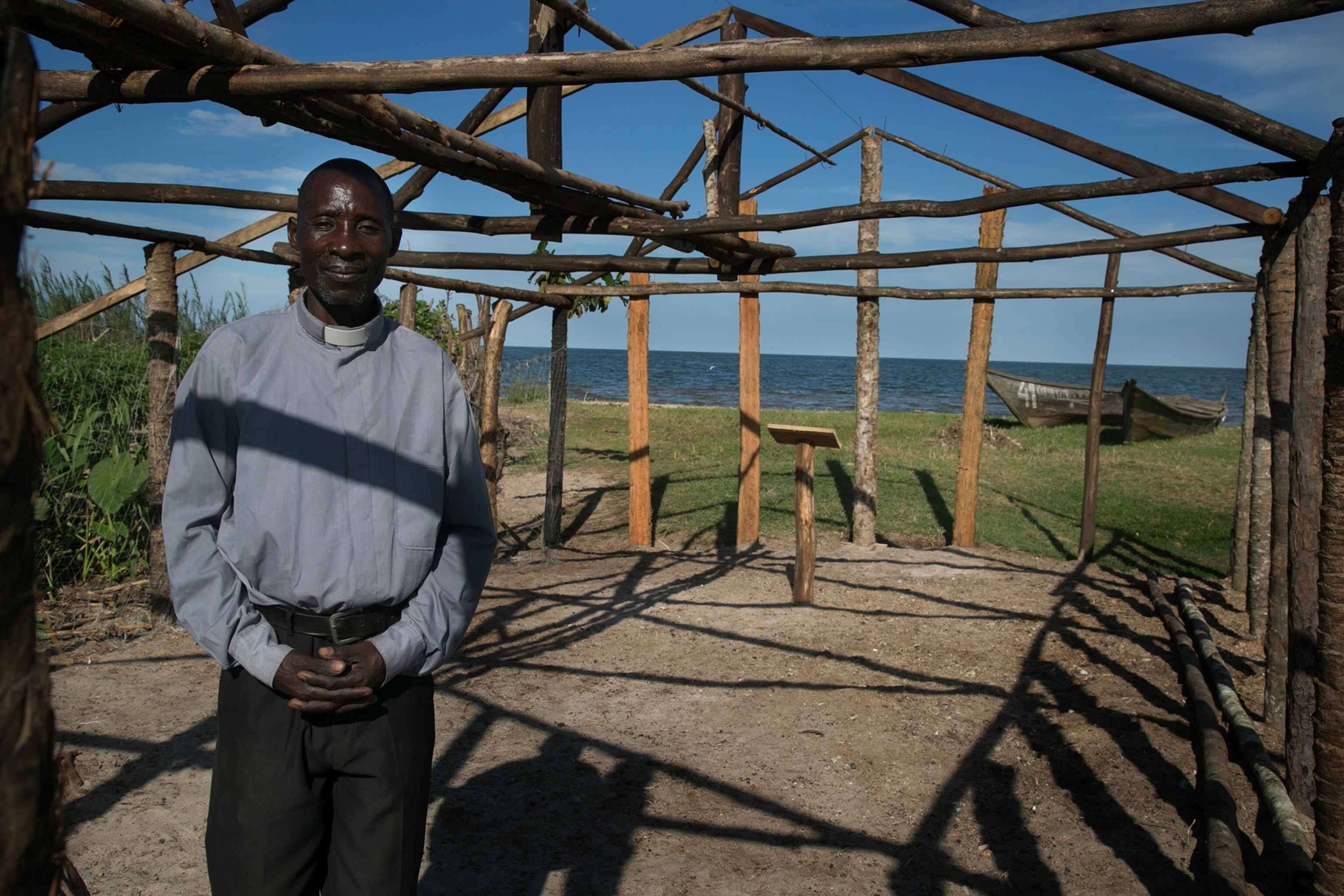
Nevertheless, in Kasensero, the mood is hopeful now. Fishermen who had predicted the end of their business when I first visited in 2015 are hailing a new beginning.
Kisakye sees it too. His flock is still small; some Sundays he cancels service when no one comes to his unfinished church. But as he watches his daughter play in the garden that he and his wife planted, he tells me his dream will be fulfilled as the fishery around Kasensero recovers.
Prized perch
One morning I watched at dawn as the Kasensero fishing fleet started to coast into the beach. Gangs of men hurried to pull up the heavy, wooden boats, chanting encouragement and drumming on the gunwales as they heaved them onto the sand. A pilot, sleepy after a night on the lake in an open pirogue, climbed to the center of the vessel and lifted a tarp with a flourish, showing off the catch.
Nile perch, silver with spiny dorsal fins, are the primary target; they can grow to more than 400 pounds and are valuable both on the European market, where they’re sold as whitefish alongside cod, and in China, where dried swim bladders fetch a high price. On this morning, there were no huge perch, but the boat had a sizable load nonetheless. The pilot took a smaller one for his supper while fish mongers gathered around, counting out fish and tossing them into a pile.
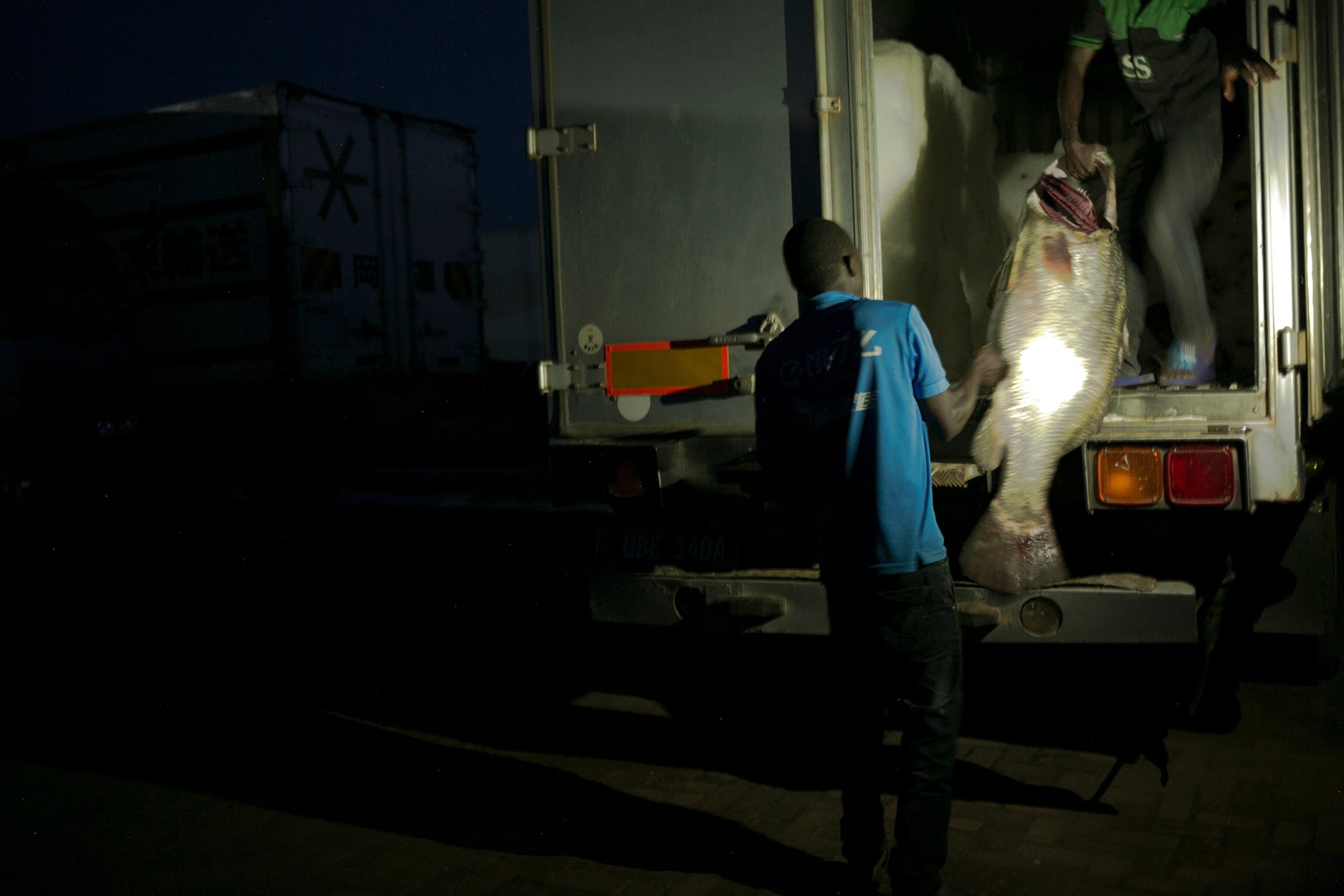
Since the 1990s, when the population of predatory perch first boomed at the expense of smaller native fish, fishing has provided a rare path to cash income for subsistence farmers around the lake—in Kenya and Tanzania as well as Uganda. That opportunity set off a frenzy on the water. What had been a small fleet of artisanal fishing canoes expanded to 200,000 boats, many of them larger and motorized, scrambling for their share of the catch.
The result was predictable. From its peak in 2002, the Nile perch stock dropped in half by 2008, as first the large breeding fish were pulled out of the lake, and then even the tiny, immature perch were targeted, in part to feed the black market in neighboring Congo. Fishermen often took their pay straight to bars, brothels, and sports betting stands to at least enjoy their cash while they could. Between then and 2013, legal fish exports fell by 30 percent.
For years, it seemed like no one noticed. Scarcity kept fish prices high, corruption kept bureaucrats quiet when they found illegal gear, and many fishermen joked that President Museveni, whose family had been cow herders, must not understand the value of the lake. In early 2015, some fishermen started to fear that their industry was collapsing. Some even began to buy cattle themselves.
But then, as the 2016 election season kicked off, Museveni took a sudden interest in fish. He disbanded the locally elected Beach Management Units and neutered the federal Fisheries Office, with the stated goal of culling corruption. By the end of 2017, after Museveni had sent a UPDF division to Lake Victoria, Anthony Tabuu-Munyaho, director of the National Fisheries Resources Research Institute (NaFiRRI), announced that Nile perch biomass had risen by 30 percent.
The fisherman and the president
As the fish were unloaded that morning, Kwiizera Fred towered quietly above the fray, watching as offers were made, cash paid, and fish were transferred into waiting refrigerator trucks. He owns the boat, as well as a string of others that landed nearby. When the catch is as good as this one, he makes a steady profit.
And, in 2018, almost everyone in Kasensero seemed to be hauling in big loads of fish. For that, many thanked Fred.
When fish stocks were faltering, nearly anyone on the beach could point to the problem. Everyone had to make ends meet, from the poorest men who untangled nets to the district fisheries officer who watched over the landing site, and catching fish was one of scant few ways to bring capital into the community. So, though it was clear that illegal fishing methods—like using small-gauge nets to harvest tiny fish before they had a chance to breed—were unsustainable, it was difficult to fight against the desperation of a neighbor and the corruption of an official.
As the fish stocks were depleted, nearly everyone had to do some illegal fishing to stay afloat, locals say. Even the members of the Beach Management Unit, citizens locally elected by fishermen to protect the fishery in co-management with the federal government, were allegedly threatened with violence or jail time in corrupt courts when they tried to do their jobs.
It was a vicious tragedy of the commons that seemed impossible to solve without dramatic intervention.

“Previously, we had very many problems and we told them to the fisheries officers, but they didn’t tell them to the president,” Fred said, sitting in the shade of a hut on the beach. “The fisheries officers were the beneficiaries of illegal fishing.” Though these bureaucrats were directed and empowered to solve the problem, he said, they had no incentive to do so.
But then, in November 2015, Museveni announced that he was dissolving the Beach Management Units and disempowering the fisheries officers. In the summer of 2016, the president visited several lake towns, meeting with members of the Association of Fishers and Lake Users (AFALU). He used the opportunity to upbraid the fishing community.
“The president said that the fishermen have destroyed their own lake,” said Fred. That claim frustrated Fred: Some of the fishermen had tried to fight corruption but had been punished by the president’s own officials and the police they commanded. Fred stood up in the crowd and criticized Museveni.
He expected to be punished, but instead the president invited him to the State House, the presidential residence in Entebbe, for a private meeting. Five other fishers around the lake who had also challenged the president at similar events went together to Entebbe.
Calling in the soldiers
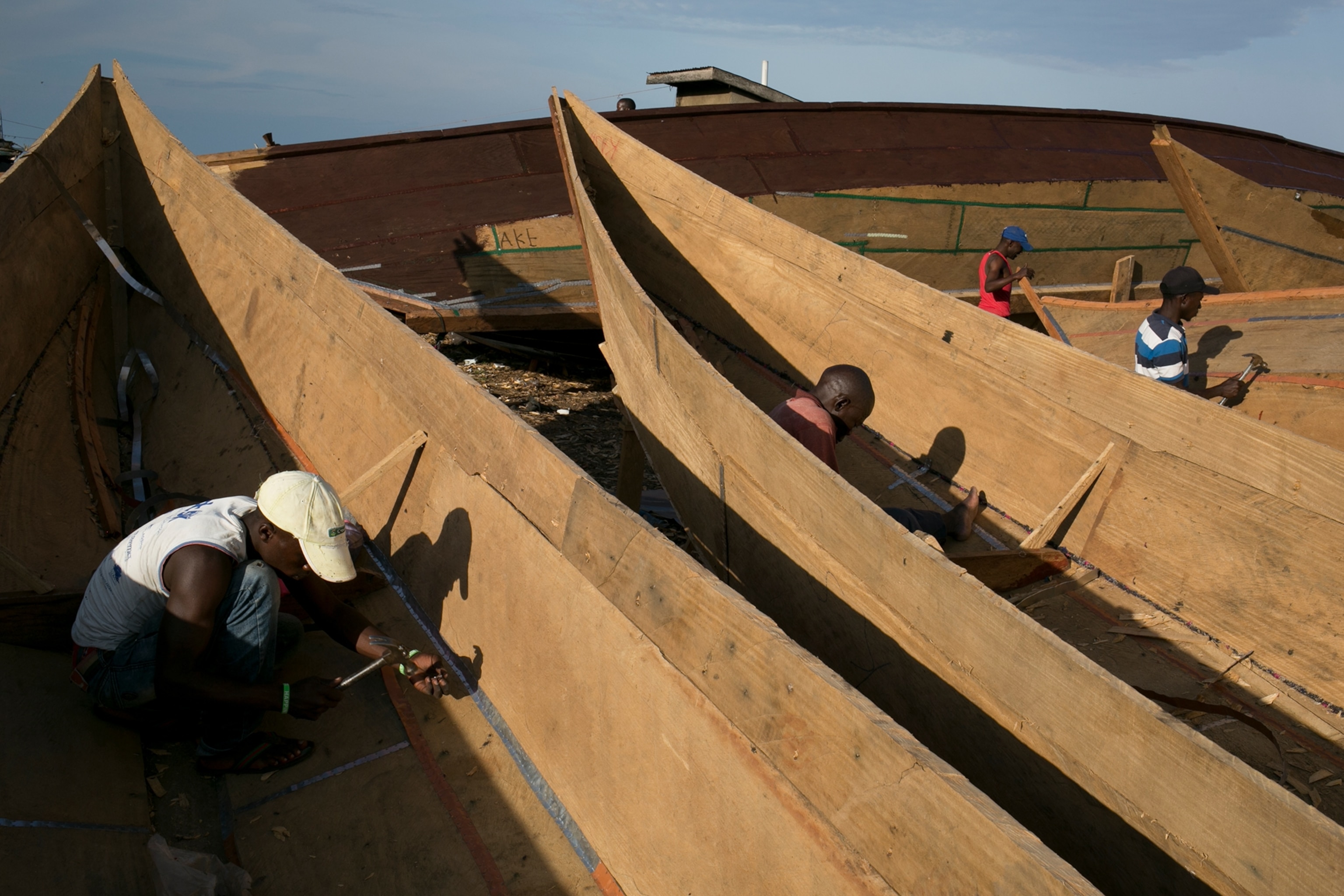
Knowing that Museveni feared the kind of rebellion that he himself had once ridden to power, Fred and the others described how illegal fish were being smuggled into neighboring Congo, where rebel groups were based.
“I asked for the army,” he said, believing that they would be less corrupt than other Ugandan institutions. Within months, “the UPDF was given authority to take care of the lake.”
Members of AFALU were asked to contribute a sum of money every month to help fund the military intervention, and Fred was proud to do so.
“The fish is ok. I get money,” he explained as the dozen or so men he employs sat nearby, gambling over a card game to pass the hottest hours of the day.
Although the director of NaFFRI announced a rebound of Nile perch within months of the crackdown, fisheries stock specialists at the institute say that it will take until close to 2020 to document a scientifically significant increase in the population. But data from a 2018 hydro-acoustic survey shows an increase in the average fish size, particularly in the Uganda part of the lake.
On the beach in Kasensero, fishermen said they already feel a change.
“Between 2013 and 2015, most people ran out of the business,” Kaweesi William said, watching boats bob offshore. Though he owns a small fleet, he said, for a while his catch was so low that he had to take his eight-year-old daughter out of school because he could no longer afforded the tuition.
In the worst months, each of his boats were grossing less than 500,000 shillings (about $135), out of which he had to pay upkeep and fuel costs, and then split the profits with the boat pilot and the first mate.
“Nowadays, a boat can make a profit of 8,000,000 per month,” he beamed. His daughter is back in school.

The 2018 fishing season lasted longer than any in years and, optimistic about the shift, many fishermen ordered new boats.
“Last year, we stopped working in the fifth month and rested a long time,” said Joseph Tamale, a boat builder. “This year, no rest.”
Some fishermen were even eying more expensive purchases. One morning on the beach, as I was drinking milky tea with two boat owners, they asked how much I thought it would cost for them to import a Jeep. Could I send them one? they wondered.
Controversial enforcement
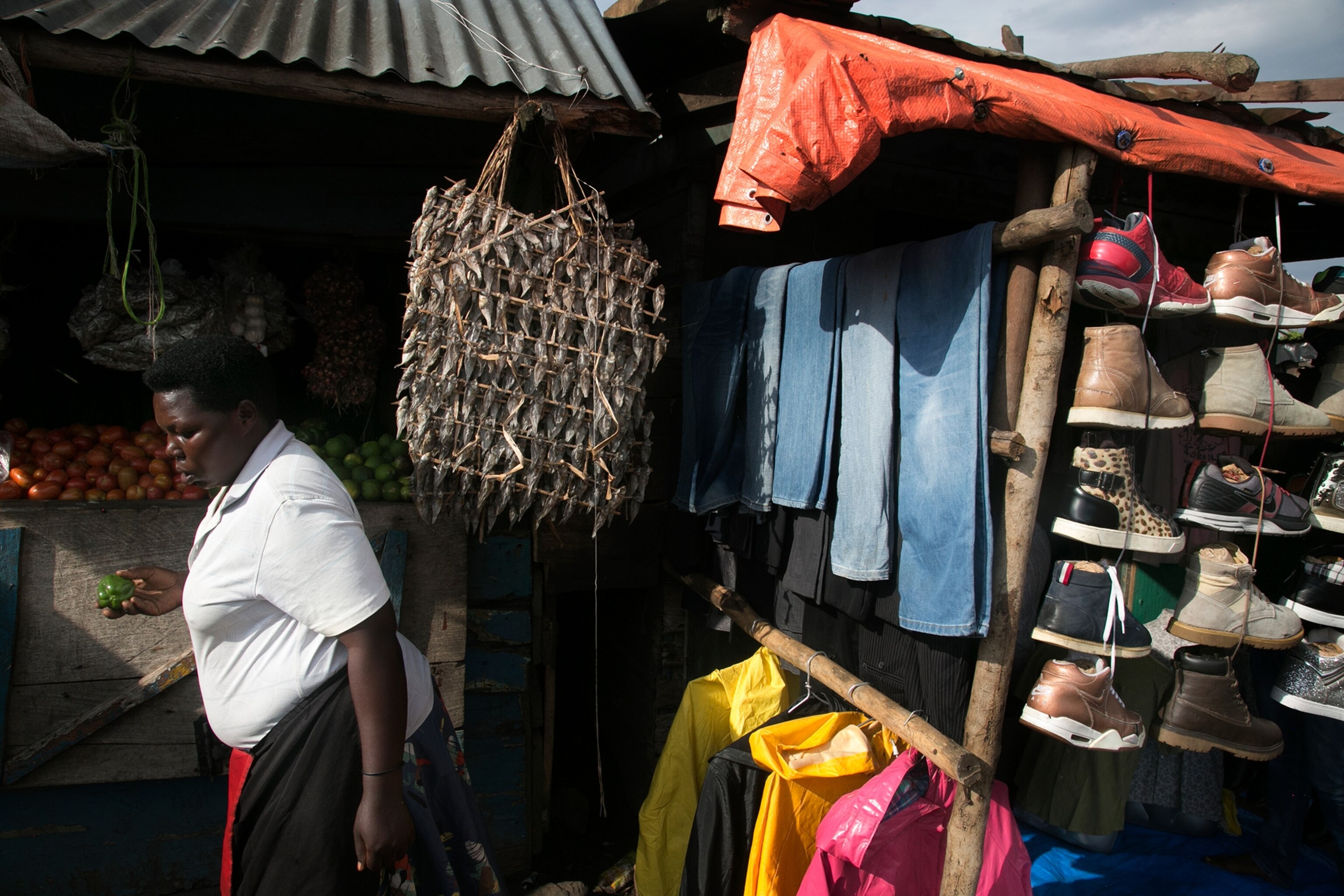
The NAFiRRI report on the 2018 hydro-acoustic survey concluded that the increase in fish size in Lake Victoria “may possibly be attributed to the current effort to combat illegality using the military. It should be noted, however, that such interventions can have other undesirable effects.”
Kagalula, who only goes by one name, says he is someone who felt such effects. As we spoke one day in Kasensero, he was gazing at an empty patch of sand between wooden huts where his own home used to stand, before, he said, it was burned to the ground by the UPDF.
He was away that day, but his neighbors told him later that a pile of illegally small nets had been found sitting outside his house. It remains unclear who owned the nets, but at the time the soldiers threatened to burn down the whole neighborhood if they weren’t told who was to blame. The neighbors allegedly pointed their fingers at Kagalula, and his house was set ablaze.
“They burned even the mattress,” he said, as goats wandered past. “The nets were not mine!”
The military declined to discuss specific incidents. But similar reports are common around the lake. In January 2018, Emmanuel Mutaizibwa, the investigative editor for NTV News and the Daily Monitor newspaper, published a story documenting the deaths of multiple fishermen during UPDF raids and accusing the soldiers of extrajudicial killings. The government has officially denied the accusations, though members of parliament have continued to protest what they call heavy-handed policing on the lake.
Kagalula had to restart his life from scratch and now lives in a ragged straw hut.
The costs of the crackdown and the benefits of the fishing boom haven’t been spread equally in Kasensero: There is a strong divide between the rich and the poor. Mostly, the rich own boats that can motor deep into the lake and they hire pilots to take the physical risk of fishing. Poor boat owners have to paddle their smaller boats themselves and rely on the cheapest gear available, which is often illegal.
When the UPDF started cracking down, they seized illegal gear whenever they found it, often burning large piles of small-gauge nets on the beach. Rich and poor fishermen alike lost equipment, but, while the rich were able to afford legal nets, the poor often went broke when their nets went up in smoke.
“The big players are the ones who win,” said Paluku Theophile. “But most of the population, in most cases, win nothing.”
Theophile used to trade in illegal fish, buying them cheaply on the shore, salting them, and smuggling them into the Democratic Republic of Congo. He and his wife Katungu Mwasimuke originally landed in Kasensero after fleeing violence in the DRC. An entrepreneurial couple, they found that smuggling fish to their war-torn home country was the cheapest business they could start.
When the UPDF arrived, the soldiers cut off the couple’s fish processing almost overnight.
Mwasimuke fled back to Congo with the children. Unable to afford any other kind of fishing, Theophile ended up going into the nearby cane fields, taking the backbreaking work of processing sugar. At night, he works in his brother’s shop stall.
Residents of Kasensero point to whole sections of town where fishermen packed up their houses board for board and left. And scientists say this probably accounts for some of the increased catch: There are fewer boats on the water. But some locals ask if the social cost is too high—and hope for some relief as Museveni, who has been in office 33 years, looks toward the 2021 elections.
“With the last two years of his term, he’s going to let us come back, tell the military to go away, leave the people alone and let us do our illicit fishing,” Theophile said.
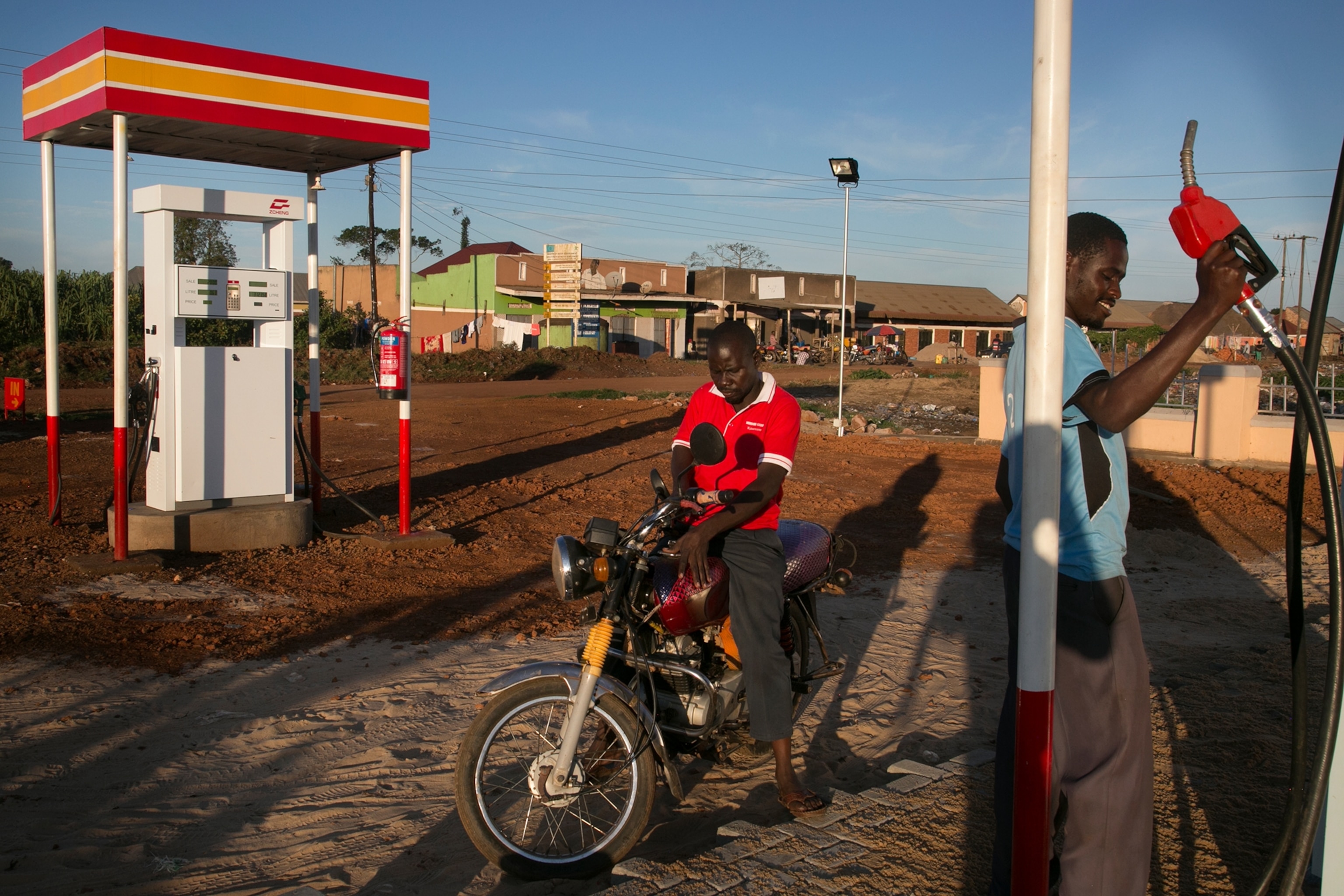
New hope (and gas pumps)
Kayumba John is one of those who thinks that, over the long term, “there has been a tremendous change for the better” in Kasensero.
When he and his brothers arrived in 1994, the town was a collection of small huts. They had fled the genocide in Rwanda, but were reminded of it every day as bodies of their countrymen flooded out of the nearby Kagera River and washed up on shore in Kasensero.
But, the brothers bought boats and caught fish when they were plentiful, becoming wealthy. They built the first gas station in town and John’s house was one of the first to have a metal roof instead of traditional thatch.
John is a jovial man with seemingly unlimited reserves of paternal instincts, buying sodas for friends and hosting afternoon gatherings to play a local board game. He supports nearly 30 children, between his own, a dozen of his late brother’s, and another nine he has adopted over the years.
Though the crackdown on illegal fishing had side effects—John himself lost his position as chairman of Kasensero’s Beach Management Unit—he believes it was ultimately a good thing. “Now people will believe that things will keep getting better,” he said. Fishermen are investing in the future instead of planning exit strategies.
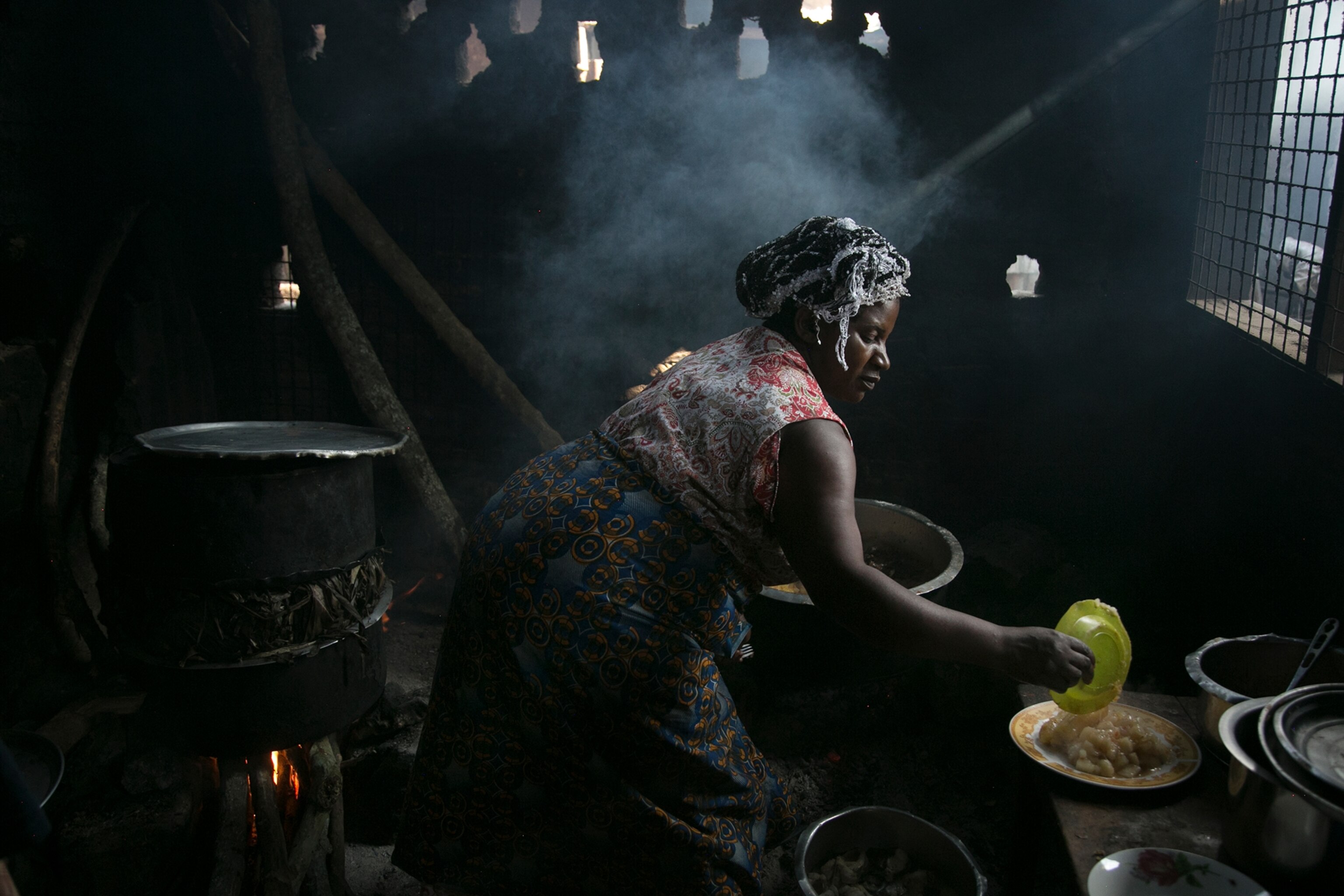
Even outside investors are coming to town. A company from the city of Masaka has built a new gas station; under the only street lights in town a steady stream of motorcycles, refrigerator trucks, and boat captains line up to fill their tanks. There’s even a new hotel. And near Ssebulime Kisakye’s church, the shuttered fish-processing factory was recently bought by a Kenyan who expects to re-open it soon and employ dozens of workers.
John’s fishing company is called Besiga Mukama: “Those Who Believe in God.” It seems like his faith is finally paying off. “I had the vision before, but people didn’t stand by it,” John mused. “I am very, very, very grateful.” He has decided to run for mayor.